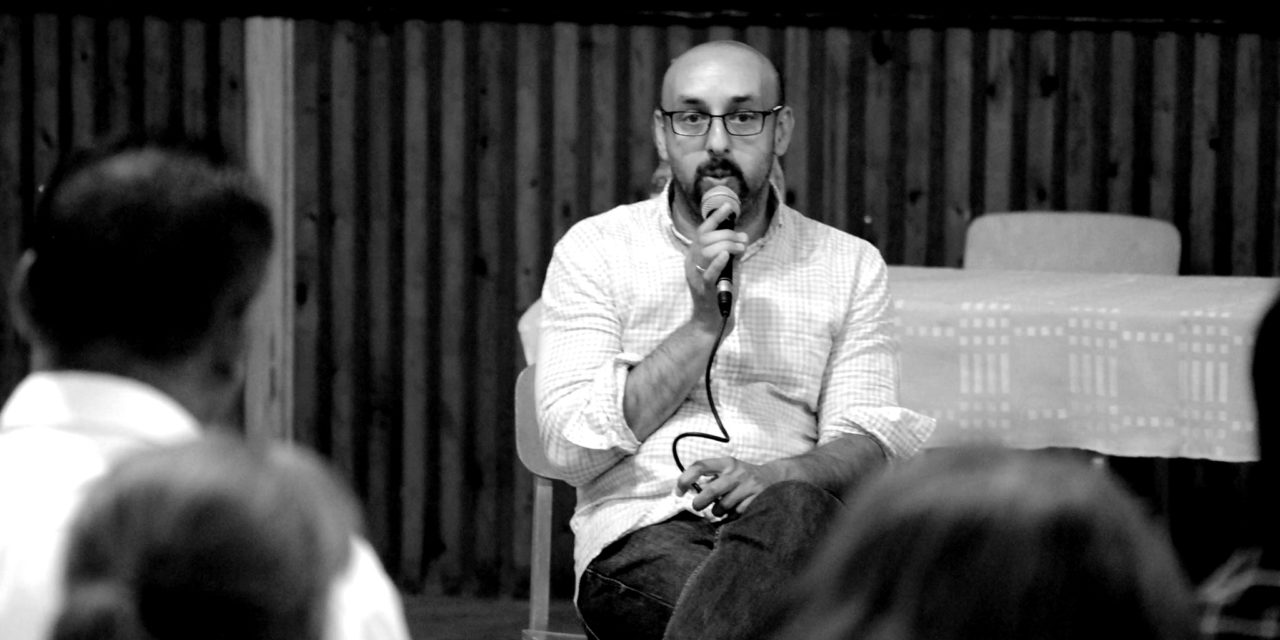Gypsy or Roma, prejudice or experience, cause or consequence? We talked with expert István Forgács about the introduction of school security, mental instability, the causes of bad decisions that are often repeated in Gypsy communities, i.e. the domestic tensions between the minority and the majority society, according to whom it is no longer a matter of whether we have the right to choose which school we want to send our children to, but about whether we have the right to decide which school we do not want. Are we talking about the responsibility of the Gypsy communities in this matter? Are we talking about why the schools their children attend are not attractive to mainstream society?
What are the feedbacks of the Roma communities regarding the introduction of school guards?
There was no reason to panic as much as there was before the introduction. Where I recently visited a Roma community, and a school police officer was also on duty, there has been no conflict there so far. It seems that the families, parents, and children were able to accept it, and although we have only been there for a few weeks, the first impressions are clearly positive. I think a lot of people overreacted and forced the narrative and image that an armed man with a gas spray and a rubber stick would beat the children.
Did external actors cause the panic?
Yes, but there is a very strange contradiction here: on the one hand, there is a global agreement when it comes to taking action against Internet atrocities and verbal abuse – bullying in English terms. So there is no dispute about this, there is complete agreement. On the other hand, if the harassment takes place in person, if the person with glasses, the freckled person or the overweight person is harassed or physically abused face to face, then why is there a discussion about this? Because the latter is not acceptable either. And the role of the school guard is precisely to help draw the boundaries on the spot, since any form of violence should not be commonplace in school communities.
How much emphasis is given to the prevention aspect?
Big! The person of the school guard expresses that you can't do everything at school, you have to follow the rules. Teachers should not be tasked with this form of discipline, yet many expected and expect it from them. Of course, the school guard has no business raising the child either, but his person has a signal value, since the school cannot give space to anything. It can no longer be tolerated - and this was a problem mainly in vocational secondary schools and at the end of the upper grades of primary schools - that some children and their families thought violence and violent behavior were the most natural thing in the world. And if from now on, the school guard not only helps the parents not come in to attack the math teacher, but also helps the children not take each other's things and scare each other, then this is a good thing. And hopefully that will make a child think twice about what they can and can't do at school. Let's finally say it: you can't do anything without consequences and sanctions, and for this - if you don't have your own discretion - the presence of the school guard is necessary.
entitled Anti-Roma is the main reason for Roma children falling behind in school in Hungary was recently published . To what extent do these types of approaches, which view the relationship systems between social groups as a one-way street, and rigidly confine the participants - often contrary to reality - to the roles of always the culprit and always the victim?
As I see it, this type of writing is often rejected by the target audience itself. Of course, the author can wash his hands of the international perspective and so on, but both the title and the content suggest that exclusion is the number one reason for the failure of Gypsy children, and that he blames the majority society for that. But if I look at the reactions, I can see that all this is just fuel to the fire, because the majority of the commenters loudly gypsy and send the researcher to reality.
This approach gives the opportunity for social groups to "sit down" and talk honestly about who still has what kind of backlog in relation to common problems to be solved?
Of course not, and that's a problem, if only because it's counterproductive. I used to say to this that we will get nowhere if we are still arguing about whether I can call a gypsy a gypsy or I must definitely call them a Romanian, because that's the way it fits.
Shall we say that the domestic Gypsy issue is a three-part story, in which the two stakeholders are present – the majority and the minority society, and their representatives – and as a third party a kind of self-proclaimed world solvers who, by clamorously advocating for a solution, are actually only deepening the ditches?
I do not necessarily question the good intentions, but we are often in trouble with the effects, and perhaps some actors are not aware of the reality. For example, the right to freely choose a school is a right that I would certainly not restrict: today it is not about whether you have the right to choose which school you want to send your child to, but whether you have the right to choose which school you do not want to send it to. And this is no less important than the other approach.
We have reached segregation.
Yes, but no one should be deprived of the right to send their child where they do not want to go. I understand that this induces a kind of exclusion-like process, but it is not only the right of where the child can go that is important, but also that the same should be with the opposite sign. Moreover, the Gypsy child and his family have the same right as a non-Gypsy. Of course, whether the parent has enough resources to take his child from, say, Gyöngyöspata to Gyöngyös, is another question. But the most important thing is why parents take their children to another school, why they don't want to send them to school together with gypsy children. Is this the cause or rather the consequence of something?
Let's clarify this question: is the problem with the fact that they are of Gypsy origin, or with how some children who happen to be of Gypsy origin behave?
I'm asking something else! Would anyone move to VIII. district, just in general?
Depends.
Yes, it absolutely does, it depends. Because the district can have good parts and bad parts. That is why a person's right to what they don't want should be respected just as much as what they do want. If district boundaries were defined and school elections were not allowed, on the one hand, no political party would dare to undertake it, and on the other hand, parts of the country or at least counties would be reorganized in an ethnic sense, even faster than before, only now with real intent and active manipulation. So that would hardly be good. So if the Gypsy children want to go to schools where they are not only among themselves, then they also have to make sure that the non-Gypsy children don't go. Are we talking about the responsibility of the Gypsy communities in this matter? About keeping the schools their children attend attractive to mainstream society? But it is also an important question whether it is absolutely necessary to force mixed schools, especially in places where demography and the right to free school choice means that Gypsy children remain in the majority, and the process is characterized by a kind of social naturalness. I think that many Gypsy parents would not mind at all if their child went to a school where they may be in the majority, but the school is good, the teachers are good, the academic results are also good, there is discipline, etc. From now on, you shouldn't cry about segregation! It does not depend on my bench partner whether I learn the National Anthem or not, but on how I want to perform and what kind of help I get. Look at how twisted this thing is: if you close a segregated school, and a hundred meters away, you build a national school the very next day, with the same children, those who previously opposed segregation with full chest will not find any exclusion in it.
Soma magic?
A perfect example of this was when the Sajókaza school was brought to Miskolc: the majority of Gypsy children study there, following their own decision, in their own foundation school. But if the same takes place as a natural process, then they act against it, classifying it as segregation, while there is no difference in the end result. In this form, it is really soma magic, and as long as we argue about such things, we will not find a solution to something that is really important: for example, what should be done to increase respect for school and teachers in a given age group or in the family environment? Or should families also be held responsible for high school dropouts? I think that if we want changes, it should be approached primarily from the side of the communities, not from the state or the school system. Concrete example: 99 percent of Gypsy girls do not play sports after finishing primary school, they do not spend a single minute exercising. And the reason for this is not the school or mainstream society.

Photo: István Forgács collection
According to American anthropologist Oscar Lewis, eradicating the culture of poverty is more difficult than poverty itself, i.e. catching up is a complex task. What does it look like from below? What is field experience?
In many Hungarian Gypsy communities, I find that although the state creates most of the conditions, they are not able to make good use of them. Many people are not only mentally unstable, but also struggle with such serious psychological disorders - both on an individual and community level - that they need specialists. One of the reasons for this is obviously that experiencing social exclusion is a serious difficulty for many people, but at the same time it must be seen that solving them and maintaining mental health require resources and support that are simply not available in the vast majority of Gypsy communities. We are fundamentally weak, you, me, all of us, but those who have fewer resources, live their lives less consciously, make the right decisions more difficult. And it is a fact that there is less room for error for a gypsy youth than for a peer belonging to the majority society: the exposure is greater and the consequences of a wrong decision can be more serious. And this is obviously not fair, but to understand, you have to see that the current world looks like this now. A bad decision by a gypsy youth - especially if it has serious consequences - can be corrected with difficulty or often not at all. That is why it is important that they do not make mistakes and that they make good use of what little they have, but it is rather difficult to convince families and people in an unstable mental state to do so. And here comes the role of religion and church background, because they can bridge these gaps, usually with their own methods. On the other hand, in those communities where there is no support, it is difficult, almost impossible, to make good decisions. Should I buy cigarettes and drinks or trainers for the child? Should I pay my bill or should I play slot machines instead? Should I leave school there at the age of 16 or stay? So it is in vain that the state offers many opportunities if they are not or only a few people can live with them. And don't get me wrong, these are very difficult situations in which many of us, regardless of ethnicity or race, would fail because we are not strong enough, eternally aware, persistent, and unyielding. Gypsy communities should be especially monitored and helped for this very reason, so that even though they can hold on to few things, they seize it, live with it, and do everything they can for themselves.
How can a professional help, especially if you don't trust him?
This is a terribly difficult question, because to answer it we would first have to admit that the communities in need of serious help are mentally unstable. But it is almost impossible to include this in the public discourse these days. So far, however, I have talked to any psychologist dealing with gypsies, and they shared the view that they also see psychopathic factors in some gypsy communities and in some radio stations, which of course affect the others as well. And from this form of behavior only bad decisions are made, which are not calculated in advance. Did you know, for example, that starting in April, vocational secondary school students can also take out student loans?
Ouch.
You say that too. At first I thought it was cool. Then the same as you: how ajjaj. Cool for me meant that if we could come up with guarantees that could be used to spend this loan on meaningful things, then many more disadvantaged children would be able to finish vocational high school than before, because the conditions necessary for learning would be more assured. And at the moment, vocational training is the real breakthrough for young Gypsies.
Vocational high school is free, isn't it?
Yes, but a common reason why someone leaves high school is because they have to work, help their family and parents. Of course, this may be just an excuse, but it is a fact that the dropout rate among young Gypsies is very high. But without a degree, they won't be able to get a normal job later, and if a student loan can help them finish school, that's definitely a good thing. But this only makes sense if we make it sufficiently clear to young people how consciously and for what the money should be used. Because if the parent spends it or goes on drugs or other harmful and unnecessary things, then it makes no sense. However, it is absolutely clear that the young Gypsies must somehow be kept in vocational training and ensure that they graduate with a degree. Now, even in the midst of Covid, the domestic economy is standing in such a way that in those parts of the country where a large number of Gypsies live, there is a serious labor shortage; skilled labor would be needed. So the state creates the conditions, but you have to be able to live with them. In many places, I experience unrealistic demands on the government, but the state cannot be expected to cook at home in the evening, then wash and clean.
It is difficult to carry out state tasks if we expect everything from them, and then get indignant at the intervention.
By the way, I still support the boarding school - strictly on a voluntary basis - but a lot of investment should be made in this. I think the introduction of tao, which promotes social catch-up, could also be an exciting thing. Let's think about it: the economic sector could offer part of the tao offered to culture and sports to promote social inclusion, primarily through education. If, for example, an agricultural company gives fifty million HUF to a vocational high school in the area, they can use this money to renovate the dormitory. And this is in the interest of the company, because if the school becomes more attractive and more students graduate there, then they can go to work in the agricultural sector, even for the interests of this company. This could seriously hamper domestic vocational training.
How can you inject expert help into a community with a hypodermic needle?
Not possible. In order to create awareness, it would be very necessary to have good local leaders in the communities; or to reach these communities through mainstream media. If the entire Hungarian Gypsy community or at least the majority of the Gypsy communities could be persuaded to look in the mirror and look for changes that can be undertaken and carried out by themselves in every situation, instead of lawyers, that would be very good. Don't get me wrong, legal defenders are needed if there is a violation of the law, but the catch-up of the Gypsies is primarily an economic issue.
László Bogdán was such a leader.
Every community needs a person who dares to think as László Bogdán did. Today, however, they are not yet sufficiently interested in change, even though you cannot achieve anything if there is no permanent presence in the life of a local community who advocates for it. This is why I usually say that these communities need a "personal trainer", community coach, and mentor.
Can't NGOs help?
They can, of course, but sometimes it wouldn't hurt to change the emphasis there. For example, the country's largest organization for women's rights refused to come to a radio program when I asked that we not only talk about domestic violence in general, but also specifically about what should be done against domestic violence in Roma communities.
If we don't talk about it, it doesn't exist?
They said they wouldn't do it because that would only reinforce stereotypes. However, the work to be done does not go away if we do not talk about it. That is why we really need those local actors. And the country-world and the public discourse that clearly sees and believes that the more and the more we speak honestly, the closer we can get to being able to change things.
Featured image: István Forgács' collection













